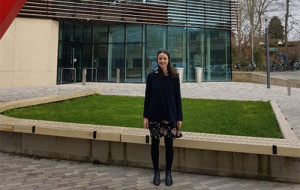Mendelian Randomization Conference
 Graduate Old Members’ Trust Travel Report – Beth Hamilton
Graduate Old Members’ Trust Travel Report – Beth Hamilton
On Monday the 17 February I travelled across the ditch to Cambridge, to attend a two-day course on Mendelian randomization. Mendelian randomization is a technique that uses random variations in our genetic makeup as a tool to investigate whether causal associations exist between a certain risk factor and disease outcome. It is an increasingly common technique used in epidemiology, where ordinarily, one of the limitations of epidemiological observational data, is that we are not able to investigate causality- a randomized control trial (RCT) is usually required.
I was first introduced to the idea of Mendelian randomization while completing the Master of Science in Global Health Science and Epidemiology last year, in our Genetic Epidemiology module. The technique intrigued (and confused!) me – I liked how it married together observational epidemiological principles and the use of genetic data to be able to test a question that was usually restricted to a RCT. When the opportunity presented itself in the context of my current DPhil in Population Health, where I am investigating the burden and host genetics of Hepatitis B infection in China, to learn more about this technique, I eagerly applied.
Thanks to the help from University College and the Nuffield Department of Population Health, I was able to attend this two-day course in Cambridge, run by Stephen Burgess and other experts in Mendelian Randomization. The course brought together statisticians, data-scientists, industry professionals, doctors and epidemiologists from across the UK and internationally. Over a jam-packed two days our course tutors presented a series of lectures, ranging from the principles of Mendelian randomization, statistical techniques and assumptions of mendelian randomization, to interpretation of mendelian randomization estimates and clinical relevance. Between these lectures we had practical sessions, where using a statistical program we put into practice the theory from each lecture using simulated datasets. I found the course was incredibly well-run- the practical sessions were engaging and really cemented the principles from each lecture, the small class size enabled a lot of hands on work and interesting discussion, and there was always one-on-one help available from tutors.
There was a social event on the Monday evening at a classic English pub near the town-centre of Cambridge. This was a nice opportunity to find out more about my colleagues who were doing the course, chat more to the course organizers, and learn more about the early days of Mendelian randomization. The course wrapped up with a “MR Hackathon”, where we broke into small teams and carried out a Mendelian Randomization analysis on a risk factor and outcome of our choosing. We had 1 hour to perform the exercise – it was a fun way to wrap up the course and I learnt a lot from seeing how one would approach an analysis in the “real-world” (and confirmed to myself that I would require a lot more than one hour to do such an analysis!). I hope to be able to utilize the skills I learnt from this course in my DPhil and am very thankful to the support from University College to attend the course.
Find out more about the range of travel grants and scholarships available to assist Univ students on our Travel Grants page or read further travel reports.
Published: 29 May 2020
